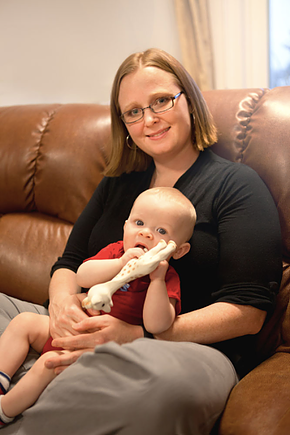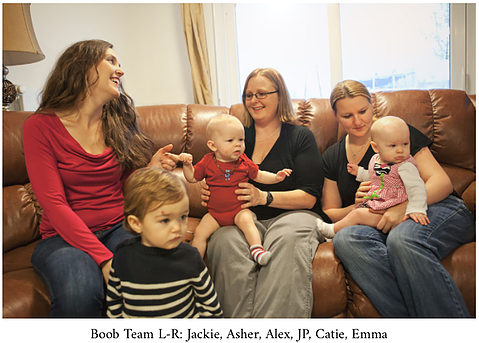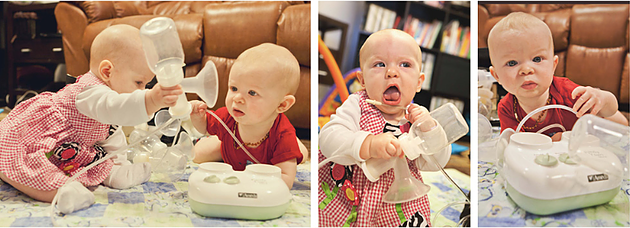
#MilitaryMonday: A Tale of Military Milk Sharing and Wet Nursing
One of the things that makes me proud to be a mother of my generation is watching us start to buck the social norms and do whatever it takes in order to get what we want and deserve for our families. All growing up, we were told that as women, we could do whatever we wanted, we could have both a perfect family and a high-powered boy-style career, easy peasy. So now that we are here, trying to have families and careers, we are realizing that having our cake and eating it too is perfectly attainable…until you add everyone else’s expectations and limits into the mix. We are expected to breastfeed our babies forever yet work full time and spend long hours at the office. We are expected to stay home and raise our kids in order to breastfeed where nobody can see us, yet not ask for government assistance for the resulting one-income household in a two-income world. The mothers of my generation are stuck under the thumb of everyone else’s expectations, but we know what WE want and now we are going to get it.
There is no better example of this than a story that played out in my small military community in Wiesbaden. An active-duty Air Force friend, JP, had just given birth to her second baby when she was chosen to attend a rare five-week-long training course overseas when her son would be four months old. It was now or never. Her first child had stopped nursing earlier than she had planned due to a similar situation where she was separated from him for an extended period, and he then had a bad reaction to formula. It was one of her greatest regrets. When JP asked for advice about this in the Facebook group of like-minded moms that we both belong to, I thought and thought about what I would have done in her situation. Having been in her same career field, I fully understood the ramifications of turning down this coveted training opportunity. As a mother, I knew how tenuous the breastfeeding relationship is and how easily it can be damaged in the early months.
Fortunately, by the end of that day, a network of nursing mothers from our Facebook group had created a solution: they would attempt to wet nurse my friend’s son as much as possible to keep him used to the breast, and donate their excess breastmilk for daycare so JP wouldn’t have to worry about the logistics of continually shipping her pumped milk home, while minimizing the use of formula.
The plan was a success in so many ways! One mother, Catelain, has a daughter the same age as JP’s son and was able to nurse him about twice a week while pumping and donating almost 100 ounces, and donating to a few other mothers as well. Another friend, Jackie, acted as official morale booster by dropping by to provide what milk she could (90 ounces), along with home cooked meals for JP’s husband and toddler son.
Of the wet nursing experience, Catelain said, “It was easy. He latched right on, actually more comfortably than my own baby!” JP remarked, “It was so weird seeing my son feeding from someone else, but it’s what I wanted.”
As for JP’s pumping experience, it was not without its difficulties. At first, she pumped every two hours around the clock, but this alongside a challenging study schedule left her too exhausted, so she was able to taper down to four pumping sessions per day with no effect on her supply.
She also developed a painful case of ductal thrush, which went undiagnosed by the local military doctor. Frustrated, and with no IBCLCs in the area, she reached out to the local network of CLCs, who were able to help her identify and present her symptoms to the doctor again in a way that got her the medication she needed to heal. At the end of the experience, she was pumping about 40 ounces per day. She stashed her pumped milk in a friend’s deep freeze. “I had a friend in the area who had a deep freezer, but she was away at the time. She convinced her housesitter to let me in with a long email explaining the benefits of breastfeeding.” To get all the milk home, JP said, “I mailed home everything but my uniforms, and checked three big coolers of frozen breastmilk as luggage!” Exclusive pumping is not for the weak! When mother and child were reunited after five weeks, “he latched right on,” said JP. “It was a little painful at first, and he was back to nursing throughout the night for a long time.” Alex is now seven months old, and continues to nurse and take daycare bottles without problems! (He did receive several quarts of formula, but he tolerated it well.)
JP’s son was not the only baby to benefit from this arrangement. JP has also been donating milk to a baby born to a military family via gestational surrogate even before the baby’s birth, and he was the lucky recipient of all 1500 ounces pumped during her deployment. “I brought [JP’s colostrum] with me to India and it was the first milk he received,” the recipient mother said. “We purchased a deep freezer and I started collecting milk after the first trimester. He is now one week shy of 6 months, and I have been able to almost “EBF.” JP has consistently donated large quantities since his birth, but her 1500-ounce donation was the largest. He was four months old when we received the 1500 ounces, and it lasted almost seven weeks. Receiving even an ounce of milk is wonderful, since that is an ounce of formula he doesn’t have to drink. My son hasn’t and probably will never receive a greater gift than seven weeks of the best nutrition available. I am forever grateful to JP and all of his other donors for giving our child the gift of breast milk.”
How many times are we active-duty mothers told that we won’t succeed at breastfeeding because the mission comes first? The Air Force does grant a six-month deployment waiver for missions, but there is no minimum deferral for training. JP and her network of friends proved that where there is a will, there is a way, and I am proud of her for demonstrating incredible creativity and commitment in getting what she wanted for her family. I am also thankful for her generous donation of breastmilk to another mother in need, in remembering my own emotions upon receiving such a huge donation.
Military family life and parenting is challenging and encompasses a wide spectrum of experiences. The military family knows more than anyone that “it takes a village,” and I’ve seen this ethos come to life more times and more fiercely in my 4.5 years overseas than anywhere else. I hope all military moms, their families and friends, and even their commanding officers will read this story and come away with an appreciation of families working together within their communities to find a solution that benefits everyone, “socially accepted” or not.
This post originally appeared on Moms2Moms Global website and was written by Nikki Williams, a doula, CLC, and former member of Moms2Mom KMC.





The views and opinions expressed in this post are those of the author(s) and do not necessarily reflect those of MomsRising.org.
MomsRising.org strongly encourages our readers to post comments in response to blog posts. We value diversity of opinions and perspectives. Our goals for this space are to be educational, thought-provoking, and respectful. So we actively moderate comments and we reserve the right to edit or remove comments that undermine these goals. Thanks!